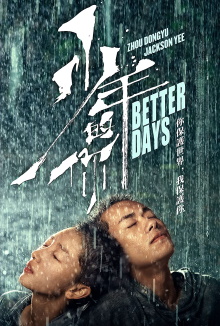This film was such a major cultural phenomenon in China that it would be remiss not to watch it. It was adapted from a popular novel but it would be fair to say that it in turn was inspired by real suicides among high students. It was directed by Derek Tsang who most people will know of as being the son of Eric Tsang but this is a China film through and through. Although it is well made and the young actors deliver excellent performances, it is ultimately a sentimental and shallow romance that panders to the sensitivities of the Chinese government and does a disservice to the issue of bullying in school.
In the final year of high school, every student including Chen Nian is under extreme stress as they prepare for the gaokao final examinations. But then a girl in her class commits suicide by jumping from a higher floor right in school due to bullying and she finds herself being the next victim. The queen bee of the school Wei Lai leads the gang and Chen Nian is particularly vulnerable as her mother is in debt and works in Shenzen most of the time, leaving her alone in the apartment. One night while walking home, she happens across a group of gangsters beating up Liu Beishan, another young thug. When she tries to call the police, the gangsters destroy her phone and humiliate her as well. Later she reports the bullying to the authorities but that only leads to Wei Lai and her friends being temporarily suspended from school. As revenge, they target her after school and she eventually seeks refuge with Liu Beishan who is trying to make it up to her for helping him. They come to an arrangement whereby Liu protects her by discreetly trailing her as she walks to and from school.
This film was a huge success in China and it does look really good. American high school movies are terrible in having actors who look far too old to make for plausible teenagers. Here lead actress Zhou Dongyu may not be a teenager but she certainly looks like one, being even a particularly frail and vulnerable one. The details of school life look realistic as well and I particularly appreciated it for giving us a view of what it looks like to take the by now fabled gaokao examination. Unfortunately most of the rest of the film feels like a fairy tale. Even though it starts with being about bullying in school, the film really wants to be a romance, a stereotypical one even between the proverbial good girl who is in need of a strong man to take care of her and a bad boy who just needs a little love and empathy. The story doesn’t care at all about the girl who committed suicide and her backstory is never revealed. The characterization of Wei Lai is all over the place, being at times so malevolent that she seems like supervillain material and other times being childishly naive. I feel that there is something in the police supervisor’s statement that having not learned empathy, the kids don’t even realize the harm that they are doing, but this film isn’t really interested in examining the psychology of this pathology either.
Meanwhile the film never falters in demonstrating the total benevolence the Chinese authorities at every level. This includes the teachers at the school who are portrayed as being genuinely wanting to help even if they are not perfect in catching every instance of wrongdoing and especially the police. The young detective Zheng Ye goes to extraordinary lengths to secure an outcome that is both morally righteous and in full compliance with the law. As with The Crossing, the film ends with an advisory notice about much the Chinese government has done to tackle school bullying. There is nothing subtle in its messaging about how the omnipresent CCTV cameras in China’s cities are like Liu Beishan following Chen Nian around everywhere she goes to keep her safe. While it is implausible that every bureaucrat and public functionary is so selflessly dedicated to public service, that is not so bad. What is bad is that in doing so the film refuses to engage in the real issues in society for which there is no easy solution, such as the intense competitive pressures at school and why someone like Chen Nian is effectively raising herself as her mother works far away.
On the one hand, the grim portrayal of the school environment and the viciousness of the bullying Chen Nian is subjected gives this a veneer of realism. On the other hand, the film is laughably sanitized in so many ways. For example, the dialogue between Chen Nian and Liu includes sexual insinuations which are amusing but we are meant to believe that they never actually have sex because they are good kids. Since all of us were teenagers once and know what they are, this is completely unbelievable. Similarly Chen Nian is roughed up and even stripped, but she is never actually raped because that would be going too far. This shows how Better Days remains a kind of fairy tale that engages with important issues only on the most superficial level. It is fascinating to watch this to see what it is that appeals to Chinese audiences and the government but this is definitely not a good film.
